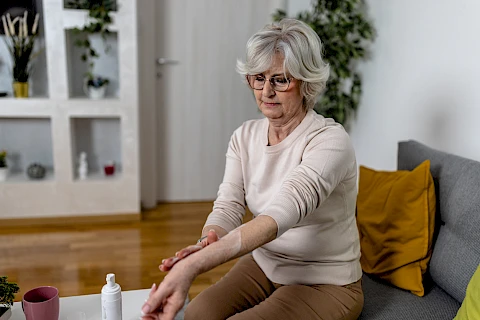
Winter can be harsh on aging skin. The colder temperatures and lower humidity can lead to dryness, itching, and irritation. For seniors, maintaining healthy skin during winter is essential to prevent these common issues and avoid complications. With a few simple adjustments to daily routines, you can keep your skin hydrated, comfortable, and protected all season long.
What You Should Know About Senior Skin
As we age, our skin undergoes several changes. It tends to become thinner and less elastic, making it more susceptible to dryness, irritation, and other common winter skin issues. Aging skin is prone to dryness and itching, increasing the risk of infections when the skin barrier is compromised. Understanding these changes is the first step to proper skin care during winter.
Choosing the Right Skincare Products
When selecting skin care products, look for rich, cream-based moisturizers to lock in moisture and prevent dryness. Ingredients such as hyaluronic acid and glycerin are very effective. Aging skin tends to be more sensitive, so choose gentle cleansers. Opt for products free from fragrances and alcohol, which tend to irritate and dry out the skin. Steer clear from skin care products that contain harsh chemicals to prevent irritation.
Hydration: Inside and Out
Staying hydrated is essential for skin health. Drink enough water to maintain skin moisture from within. Make a point to drink at least eight glasses of water a day. Keep a water bottle handy to remind you to drink throughout the day. Eating water-rich foods like fruits and vegetables can also contribute to hydration. Soups and herbal teas are great for staying hydrated and warm during winter. Externally, consider using a humidifier in your home to improve indoor air moisture and prevent skin from drying out.
Protecting Skin from the Elements
Winter weather requires dressing appropriately to protect your skin. Wear layers of clothing that shield you from harsh winds and freezing temperatures. Remember your sunscreen! Even though it's cold, the sun's rays can still damage your skin. Choose a sunscreen with at least SPF 30. Keep your hands and feet warm using gloves and thick socks, and remember to moisturize these areas as well.
Managing Age-Related Skin Concerns
Dryness and itchiness are common concerns for senior skin in winter. Regular moisturizing can manage these issues. Apply moisturizers directly after bathing when the skin is still damp. Age spots and discoloration may also become more pronounced in winter. If these concerns bother you, consult a dermatologist for appropriate treatments. They can provide professional advice and suggest appropriate skincare products for your particular skin concern.
Senior Helpers Lexington Can Assist With Personal Hygiene and More
Winter can be challenging for aging skin, but with the right care, seniors can feel their best even during the colder months. If you need additional support at home, particularly with matters concerning personal hygiene, Senior Helpers Lexington can help. We specialize in professional senior home care solutions, including personal care, assistance with daily living tasks, companion care, and other facets of elderly care. Contact us to explore your options in Lexington, Georgetown, Nicholasville, and Shelbyville!